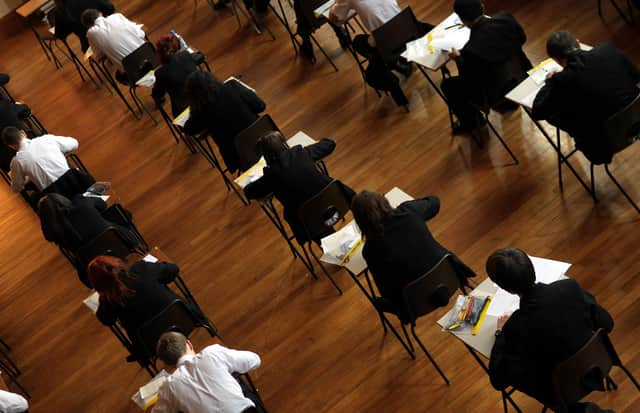Tumbling number of high performing GCSE students in Lincolnshire


As Ofqual reinstated standard grading for GCSE exams, the proportion of students in Lincolnshire achieving the highest grades has tumbled, new figures show.
It comes as the disparity between disadvantaged children and their fellow pupils, and the different regions across England has grown.
Advertisement
Hide AdAdvertisement
Hide AdWith exams suspended in 2020 and 2021 and an amended grading system last year, the coronavirus pandemic saw record grade inflation for GCSE students across England.
But Ofqual reinstated a standard examination procedure in 2023 for the first time since the pandemic, with exam aids such as equation sheets provided.
It saw results drop significantly across the country, including in Lincolnshire, with 17.4% of the 101,985 exams taken by GCSE students resulting in a grade seven to nine, broadly equivalent to an A or A*.
This was a significant fall from 23.6% in 2021 – the highest proportion during the pandemic.
Advertisement
Hide AdAdvertisement
Hide AdNationally, 21.6% of exams led to a student recording a level seven or above – roughly returning to 2019 levels of 20.6%, but well below the 2021 peak of 28.5%.
Jo Saxton, chief regulator of Ofqual, said it now believes the process is running as it did before the pandemic.
"In terms of grading, this has been the second step in the two-step plan to get back to normal. So as far as Ofqual is concerned, the organisation is now back to normal," Dr Saxton said.
But ministers faced calls to address regional disparities after the gap in top GCSE grades between London and the North East widened.
Advertisement
Hide AdAdvertisement
Hide AdOverall, 28.4% of GCSE entries in London – the top-performing region – were awarded a grade 7 or above. At the other end of the scale, this fell to just 17.6% in the North East – a gap of 10.8 percentage points. Last year, the gap was 10.2 percentage points.
In the East Midlands, 18.5% of entries recorded a grade 7 or above.
Shadow education secretary Bridget Phillipson said: "The schools minister has confirmed that Conservative promises to level up education are dead and buried."
Schools minister Nick Gibb also admitted the attainment gap for disadvantaged pupils has widened during the pandemic.
Advertisement
Hide AdAdvertisement
Hide AdMr Gibb told BBC Breakfast: "We did achieve a 9% closing of that gap for secondary and we closed the gap by 13% for primary, but that has been undone by Covid, and now we need to get back to normality.
"We’ve got the recovery programme happening in our schools right now. And then we need to get back to the reform programme to make sure that we can continue to close that gap."